A Hybrid Model That Blends Capability Building with Business Outcomes This episode explores how to…
Non-Linear Thought Leadership | Elizabeth McCourt
Becoming a Non-Linear Thought Leader, and What Does it Take to Be Successful
An interview with Elizabeth McCourt about the non-linear path she has taken and the benefits of creativity for your clients.
We interviewed Elizabeth McCourt, founder of McCourt Leadership Group, TEDx speaker, consultant, and author of the fiction novel Sin in the Big Easy and soon to be the author of her first business book. She’s a master of measuring thought leadership, and has learned a great deal about thought leadership strategy from a successful career as a lawyer, then transitioning into thought leadership. She highlights how moving from lawyer to headhunter to consultant and coach makes perfect sense! She explores how she gave a TEDx talk and how the creativity used to write her fiction novel has been helpful with her clients. Also, she explains why failure isn’t bad. Failure can be the non-linear path to success!
Four Key Takeaways from the Interview:
- Measuring thought leadership on a global scale, and how to gauge success.
- Why thought leaders should consider the purpose of their book before picking a publishing option.
- Why creativity that isn’t part of your billable thought leader hours can be beneficial to your clients.
- How thought leaders can use all the experience from previous careers to excel.
Transcript
Peter So welcome, welcome, welcome. This is Peter Winick, the founder, and CEO with Thought Leadership Leverage. And you’re joining us on the podcast today, which is leveraging thought leadership. And today, my guest is Elizabeth McCourt. Elizabeth, this is multifaceted, multilayered, interesting. If that’s a word which made that word. She’s got a TED talk. She is the head of a group called McCourt Leadership Group. She is the coach. She teaches at INSEAD. I’m sure I’m missing out a bunch of other stuff, but I’m more eager to get into the conversation. So, you could look her up in the know. So welcome aboard today’s thing.
Elizabeth McCourt Thanks for having me, sir. It’s good to be here.
Peter Cool. So, let’s just dive in. So, I think you’re a recovering lawyer. If I read my notes, right?
Elizabeth McCourt Yes. That is true.
Peter So the only lawyers I know that well, I should say most of the lawyers I know that have a smile like yours and are happy and doing things they love. Shockingly, they’re not practicing law.
Elizabeth McCourt I have found that as well.
Peter Yeah. With some exceptions. Right. True. How does one go from… Because to be a lawyer is a pretty deliberate, you know, just wake up one day and go to a shingle. Right? It’s deliberate. There’s lots of things got to do. Time, energy, effort, money. So how do you do all that and then wake up one day to take this job and you know ‘blank’ whatever?
Elizabeth McCourt You know, my story is a little bit interesting because I was in investment banking after college and I didn’t like that. And I thought, let me do something a little less stressful. And I went to law school. So, it doesn’t make any sense, doesn’t make any sense at all.
Peter Now, as you say, how did that work out?
Elizabeth McCourt And, you know, interestingly, I was a trial lawyer and I worked for a firm. And then I found that that was not the right fit. And I worked for a solo practitioner who I loved to this day. He still asked me to come back. He’s a wonderful, wonderful guy in Santa Fe, New Mexico. But then my father got ill and I decided to temporarily twenty two years ago moved back to New York. And therefore, I was no longer I wasn’t licensed to New York. And so, I tripped into recruiting, which then is a headhunter for financial services for almost two decades, and then realized that my success was based on the fact that I was I was a coach. I just had a different style. And so, then I pivoted again. So, it’s a bit of a I like to say my next book or the book I’m currently working on is about the non-linear path to success and how we navigate that. It’s just not it just not perfect the way we do our lives.
Peter Yeah.
Elizabeth McCourt And it’s OK.
Peter. So I want to talk about that because it’s interesting to headhunting is what paid the bills, but coaching is what you actually did because the actual transaction of placing a good fit in a good spot isn’t the hard part. Right. So, you became a coach by not being a coach. Exactly.
Elizabeth McCourt Exactly. I just had a different style. I mean, two reasons as my own style, I always want to be truthful with people and treat people the way I want to be treated. It sounds so trite, but I just believe in telling people the good and the bad. And I always had that approach in recruiting, which made people trust me, because I wasn’t just, you know.
Peter Well, they trusted you because they’re at some degree the traditional recruiting model is like they sugar coat it, how great it is to go work at a company X and ‘Oh, it’s wonderful.’ I don’t care what you’ve heard or Glassdoor or whatever. Trust me. It’s wonderful. It’s wonderful.
Elizabeth McCourt Exactly. I personally, I just could not do it like that. I just need to sleep that night. It was big decisions for people. So inevitably I would help them find the information they needed to make their decisions and coach them in that way, and I don’t think I realized that that was I was doing until I started pure coaching.
Peter Sure.
Elizabeth McCourt That it just was very naturally. My father was a coach and I did love sports growing up. And I feel like it was just part of my DNA, but it was really just about me. You know, I know what I want. I could tell you want to have chocolate ice cream, but if you don’t like chocolate ice cream, you’re not going to have chocolate ice cream. You decide what you want. And so that’s always been my philosophy and that’s how I approach.
Peter Yeah, two things I want to touch on, but will do it in a non-linear way because one of them don’t touch on the nominee or approach. But before we go there. So then we’ve got a TedX talk of why you should steal your secrets. How did this going to create like a random buffet?
Elizabeth McCourt Yeah, sure. You know, it’s funny. When I was when I was headhunting after headhunting. It’s truly about money. And I was very successful in that business. I mean, that’s really the game. And I came to a transition point of this is this. And someone suggested you should have a coach. And I said, that’s ridiculous. I told you. But this I go, that’s ridiculous. And I said, but I’m desperate. I will try anything. And I got coach. And I thought she was incredible. I decided to do whatever she did. And in that path of becoming a coach, I realized that I wanted to be. I want to be speaking. And I had just found out about these TedX, and I thought they were so cool. And I said, someday I want to do one. I put it on my goal. My personal goal sheet. And I got an email from my alma mater. So, SUNY Stony Brook says looking for applications. And I said I took an essay. My Ted X is really based on an essay that I wrote as part of my MFA in writing. And I just really blew that up. And it’s just about when you release the truth or a secret. Then we realized we’re not so different. We all have we’re more similarities than we are different. So it’s just very the vulnerability. Yeah. Being vulnerable..
Peter Sort of big genre of it, really.
Elizabeth McCourt That’s what coaching is too. Is it to be you have to be a little bit vulnerable and when you’re vulnerable, you connect with people and then you can grow and learn.
Peter So I want to go back to the non-linear because there’s one thing that 99 percent of my clients and the folks that we work with have in common is their career has been non-linear. You did probably. Ninety five percent is the acronym we work with. That’s very linear. But in the space of author thought leader expert, you know who’s.
Elizabeth McCourt Right?
Peter It’s very rare that somebody you know, I haven’t met anyone that says yes. What do you want to be when you grow up a little bit earlier, Jane, or whatever? You know, it’s fireman, teacher, nurse. It’s not consultant, coach, advisor, author, and sometimes, you know, expert or something like that. Like that’s not a career path roofing. And most people wind up in this space serendipitously or just stuff happens. And then it’s like, you know, they wake up like, oh, my God, how did this happen? Like it went from.
Elizabeth McCourt I know.
Peter wrote one article and then somebody asked me to speak and now I fly. Well, he’s flying all over the country giving talks and doing this. This was not the plan. So tell me about the the the UPS and deathlike went to embrace sort of the non-linear. And when you got to go, whoa, that’s actually, you know, sort of ADD gone wild.
Elizabeth McCourt Well, you know, if someone has a creative approach, I you know, I like to do a collection of things and feel like it’s all related somehow. But I do believe that everything that you’ve done brings you to where you are. Like, if I hadn’t been a lawyer, if I hadn’t done investment banking, if I hadn’t gotten all of these things that I’ve done, actually make me better at what I do. And I don’t think I recognize that. Or maybe you don’t recognize that until you kind of realize that you’re allowed to leverage the entirety of your experience. We never really, you know, quote unquote, knew what we’re doing. We might feel like that we haven’t done it before, but we’ve had different experiences that that allow us to sort of leverage those different points to move forward. And I really was at I was giving a talk at my at University of Maryland for the business school. And I was like, oh, gosh, everyone here, you know, the two other panelists were linear. And I was like, I’ve done this and that. Yeah. I thought, wow. I thought, this is a little bit embarrassing. But, you know, if I’m successful, but it’s like it didn’t go straight. And afterwards I realized that it was a huge sigh of relief to the MBA to realize that just because you didn’t do one plus one is two, you didn’t go on that straight path does not mean failure. It’s more of. Wider breadth of experience. But like you said, I think sometimes we have to fail. Sometimes we go one direction and it doesn’t work out. But you have to think, what can I what can I learn from that? So I can either say no, no way I can pivot or I can build upon it in a different way. So I think none of it is really. I think I look at failure that way. And I encourage people that just because you tried this and it didn’t work. Better to know soon than.
Peter Sure.
Elizabeth McCourt You know, invest hundreds of thousands of dollars and habits. It better to. You know, I would say, you know, do as do a side hustle. Figure it out just before you go all in. And that’s OK.
Peter Exactly. So I want to touch on the book that you’re working on. And then I want to talk about the overall business at McCourt. So you’re in the process of writing a book and you and I were chatting earlier. Yeah. You know, sort of. Well, this is your second book. And I said, well, the first one doesn’t count because we don’t we don’t know what that is.
Elizabeth McCourt So although they did say that fiction helps your mind think it was just an article, I think in the Times or something about fiction being good for you.
Peter Well, there’s been some really bestselling nonfiction books that have turned out in the end were fixed.
Elizabeth McCourt So that is also true. That is also true.
Peter But in the traditional definition sense during the process of writing your first business book. So. Exactly. So, I want to understand sort of where you are in the process and list. And this is the part that people are intrigued with this sort of decision making. Right. So I think what happens is when people go into book mode, there’s this learning curve of holy crap, like there’s a whole like, I know what I want to write, how I want to write it, what I want to say. That part’s almost easy. But do I self-publish? Do I. Do I go to the original but do what everybody like? So, what’s your journey? What’s your what’s your book to date story?
Elizabeth McCourt Yeah. Well, you know, it’s funny because I feel like there are so many different options and none are bad. I mean, if you wanted to self-publish, that’s no there’s no longer a stigma attached to self-publish.
Peter Let’s stay there for a minute. So, I want to stay there for a minute, because I think that’s a thousand percent true. And I think there is this old newer publishing house arrogance fallacy going on where it used to be 20 years ago that, you know, if you self-publish, it sort of was saying, yeah, I got rejected by all the other pieces, become a little vain or whatever. It is absolutely, unequivocally not true today. I think I’m the only dork that I know that when I was, I read most things on my Kindle. I go back to the filler pages to see who the publisher is. More out of curiosity. Yeah, I do too, because. Okay, great. We could we would need a 12-Step program for people. Yeah, whatever.
Elizabeth McCourt Who is who is the agent? Who’s the publisher? How are they? You know what?
Peter Yeah, it’s do it. But I’m looking at things in Publishers Weekly but it’s this is what we didn’t write. So but most people, you know, download a book, open it. These are the best of times is the worst. Like that’s it. Right. And right. It will either be a good book or it won’t. It is very, very, very, very rare today for a self-published book to look like the crap. All of that used to come out 20 years ago. You know, trial printing and then publishing. So I just wanted to validate that destigmatize.
Elizabeth McCourt Yeah. And I really appreciate moral issues. Yeah. And also, I felt a little smarmy about it. I felt like you couldn’t get published traditionally then. You know, maybe it wasn’t you know, maybe it was because of that. But I don’t I don’t agree with that. And I. But I do think the most important thing to think about is, you know, what is your purpose of writing this book?
Peter So it’s a purpose interchangeable with goal or like what does success look like? Or because there’s a purpose piece of I’m writing this, there’s an intrinsic.
Elizabeth McCourt Yes.
Peter But they also understand the extras because writing a book is an incredibly expensive process, whether you self-publish or not, just for an absolute. If I were to say he was the kind of thousand hours of your time, you’d say yes. And the invoice will be.
Elizabeth McCourt Exactly. Years of time.
Peter Yeah, exactly.
Elizabeth McCourt But I do think there is that question of what I learned him even publishing my novel of fiction is there’s a distribution piece. So I think that is an important consideration. If you want to get your book into bookstores and certain other venues, if you self-publish in a certain way, that that door will not necessarily be open to you. Yeah. Yeah. And so there are I feel like there’s three models. There’s a pure self-publishing where you just press the button on Amazon and then there are now there’s a lot of hybrids where sometimes I call Peyton Place. Yeah. Some of them are pay to play where you pay a couple thousand dollars and you get their distribution. So it’s sort of a split profit sharing or there’s a difference. And you know, there’s another model of you you don’t pay to play, but it’s a different kind of profits, a profit share. And of course, in that middle range and all the ranges, you have to do your own promotion and advertising. But really, the key will.
Peter Stay there for half a second because you go through a critical point. And in all of those models, let’s those are business model decisions. Right. So if you’re to really get an advance. Then you guys, I got an advantage. But what am I? I mean, what’s the discounted cash flow for that? Right. So I’m getting a. And by the way, advances are scarce today, but I’m getting a $50,000 advance and the book’s going to be a great bestseller. Did I just sell a dollar for a dime? Was that a dumb business move? What’s the point that you made that I think people don’t understand is if you regardless of the model, whether you’ve got wily Random House or greedy or whoever. Right you are. Congratulations. You’re not just the off the title author of the book. You’re the SVP of Marketing.
Elizabeth McCourt Absolutely.
Peter And if you don’t understand that, you’re going to have what I call sort of book postpartum 90 days out.
Elizabeth McCourt True. And I’ve seen people do it. They go, I published a book and then let the world have it. But if it means the hustle to I mean, it sounds so dumb, but to get people to review on Amazon is really quite a feat. You have to beg, borrow and plead for people who genuinely like the book, but they are just family members. No. Yeah, they will. Yeah. But it’s true. But I think that something like that really counts. Getting people to review it, having a platform, of course, having a platform of, you know, Twitter, Facebook, Instagram of any other kind of social media. You know, YouTube, page, podcast, all of those avenues are part of the revenue model and of how much time do you have to invest in that and dollars and dollars. Yeah. Because it’s not cheap. You hire a PR firm. I mean, it’s interesting for fiction. I had a budget in mind of what I was willing to invest for promotion, which is a different number than my business book because there would probably be at a zero just based on. Yeah, I mean it’s true. So it’s sort of fiction that for me was a personal goal. Sure. And it felt wildly successful to get it done. And that fact that people enjoyed it was wonderful. But a business book is different because that’s you know, that is part of my business model. And further, if you will, I guess, marketing of myself, some business. So it’s different. So when I said purpose is what is the purpose of the. Is the purpose pleasure. And you don’t really care. Is the purpose to promote a certain model of your business or style of your business or legitimacy? A lot of people do legitimacy for speaking that as a as a platform for that. So it’s really box. You’ve got the base. So really what is and I know is sort of but it is really a marketing question.
Peter So what is your purpose for you then? This is a good segue way into sort of the business side of the house. What are your goals and objectives? When’s the book coming out?
Elizabeth McCourt Well, hopefully my goal is the next know this year to get a good solid draft and then to figure out what is my best avenue of publication. I’m not I’m not sure yet until it’s finished.
Peter So I’m guessing you don’t have you don’t have a gun. You haven’t committed to the publisher.
Elizabeth McCourt Yeah, well, I actually my publisher who published my fiction is interested in this book, too. Okay, cool. So I have I have an option. So I and I but I just have to decide when it’s done which option benefits both myself and the book.
Peter And interestingly, writing the book first, because that’s one approach, not the only approach.
Elizabeth McCourt It’s true. You can do. I mean, I have sent out proposals. So usually I think I think if you’re unless you’re quite famous. I think you have to write a lot of the book first.
Peter Yeah, it depends. Either famous or have a massive following or yes, some kind of. Exactly. Famous and.
Elizabeth McCourt The following. Yeah. You’re professor of X, Y, Z and they’ve asked you to do so. Sure. If you’re in a sort of regular person, you probably should show that you can get a book complete.
Peter Yeah. Which is not a an easy task. No, no, no it isn’t. So let’s move on to you know, it’s now, you know, blink. Fast forward six months. Post the book being out. What are the what is the impact you’re hoping it has on your business and maybe before that? Tell us a little bit about what sort of what the businesses. What are you doing? What are the various business lines?
Elizabeth McCourt Oh, sure. I mean, I have, of course, because I’m non-linear. I have a variety of business lines.
Peter I was gonna guess that.
Elizabeth McCourt So I do. Well, I’m an executive coach and call the leadership coach. And I work globally with my own private clients. So, I have. I like to have a small roster of clients because I like to really keep what I do intimate. And so, I have all is that is at three five. So, yeah, I have I have a core. I do corporate clients and very few private clients. Yeah. I work with the operation coach. A couple of executives do it like that. And then, you know, very small number. I said less than now it’s less than three private one on ones as mostly corporate. And then I also don’t teach it INSEAD but I do, you know executive leadership develop with them in a group form. And I travel all over the world to do that with them, which I absolutely love. It’s wonderful work. It’s an intellectually stimulating. And I’ve gotten to go. You know, of course, to Europe, to Saudi Arabia. It’s really yeah, it’s exciting. And I do that with a couple of other organizations. Another one in London. KTV, I think Kets De Vries Institute. And with them, I’m actually also teaching certification for them. So that’s it. I’m teaching there. That certification of a 360 tool, which is nice, which is 360 is not yet a value added for an executive. So that’s exciting. And then I also have two workshops and speaking as well.
Peter So it sounds like everything that you’re doing is dependent on you. Right. So you’ve got this body of work, this body of knowledge. Yeah. But like many folks that we work with, if you’re not in the room, whether that’s physical or virtual with the content, money is not changing hands.
Elizabeth McCourt That’s exactly right. Yeah. So it’s based on me. So that’s why collaborative work or having a book would be important to sort of expand the model.
Peter Right. Right. So now you can move into whatever you do go from sort of an analog universe to a blended analog digital.
Elizabeth McCourt Exactly. Exactly.
Peter Goals and assessment’s, etc. And that’s important because I mean, my view, the world according to me, which may be accurate at any point in time, is there’s only three ways to make money with your ideas. Right. So you do more of what you’re doing. If you’re not at capacity, whatever capacity means to you, you do more of what you’re doing at a higher price point as as your brand elevated mistried, solve bigger problems and maybe have a book and other things. And then ultimately that caps out, right? Because you can’t just say I’m going to charge a million dollars. That’s not going to work for me. I’m gonna be nice, but. Yeah, yeah. But then ultimately it’s it’s the digitization of the scaling of it, which gives you a bigger impact that a bigger region and a higher level of monetization. So sounds like you’re in that sort of second bucket bordering into the.
Elizabeth McCourt Yeah it’s sort of the interest in and quality over quantity. Yeah. Yeah. You know startup space cavy is doing too much and you can’t. Right. And so I want to have space to do other creative avenues because when I’m flexing my creative muscle, I’m actually better for my clients.
Peter Right. But that’s it. But the clock’s not running, right. So you need to take 20, 30 percent of your time to sort of solve problems, to think about things, research, be creative, whatever. That’s that’s not billable work.
Elizabeth McCourt That’s true. Yeah. There’s no annuity in brainpower.
Peter Well, and the reality is, nobody’s ever bought anybody’s speaking business or one on one coaching business. Right. There’s no.
Elizabeth McCourt That’s right. Because it’s me and it’s you.
Peter No institutional value of that. You’ve got to you’ve got to you know, and there’s never been good or bad. But if you’d like an exit, if you’d like to have the annuity, you’ve got to develop the business in ways that make that happen. Right. Right. Well, this has been cool. Any final words of non-linear wisdom? I think whatever wisdom or whatever linear wisdom.
Elizabeth McCourt Well, I feel like, you know, another of my philosophies is sort of to take yourselves holistically, like something that you do in the like. Don’t think. Writing a novel or doing a sport or playing guitar, whatever it is, has no value. I mean, Einstein used music to help him solve science problems. So sometimes I tell people to take what you’re learning from whatever it is that created and see how you might leverage that in a more analytical or professional way.
Peter You know, I think that’s really true because I can just as you’re saying that I can think of several of clients off the top that do improv, are in jazz quartets or magicians are like all this artists. All these interesting, crazy things. That’s sort of the other side of them that they keep it secret. But it actually it’s the nonpublic side of them that makes the public side of them better because, you know, it’s true or it’s also problem solving, because sometimes I’ll say the client, you know, OK.
Elizabeth McCourt So if you’re you know, if you’re doing magic, you know, sort of take that approach and then shine that light onto a problem you’re solving in the business world. Just to give yourself a different perspective. Exactly.
Peter Well, this is phenomenal. Thank you so much for sharing with us.
Elizabeth McCourt And I think it’s been fun. You tried to keep it from linear, so that’s good. That’s right.
Peter Maybe when we play this, we’ll start in the beginning. We’re in the middle and you can go forward or backward. We’ll see. Great. Thank you so much. Yeah.
Elizabeth McCourt Thanks, Peter. Take care.
[/vc_column_text][/vc_column][/vc_row]
Comments (1)
Comments are closed.
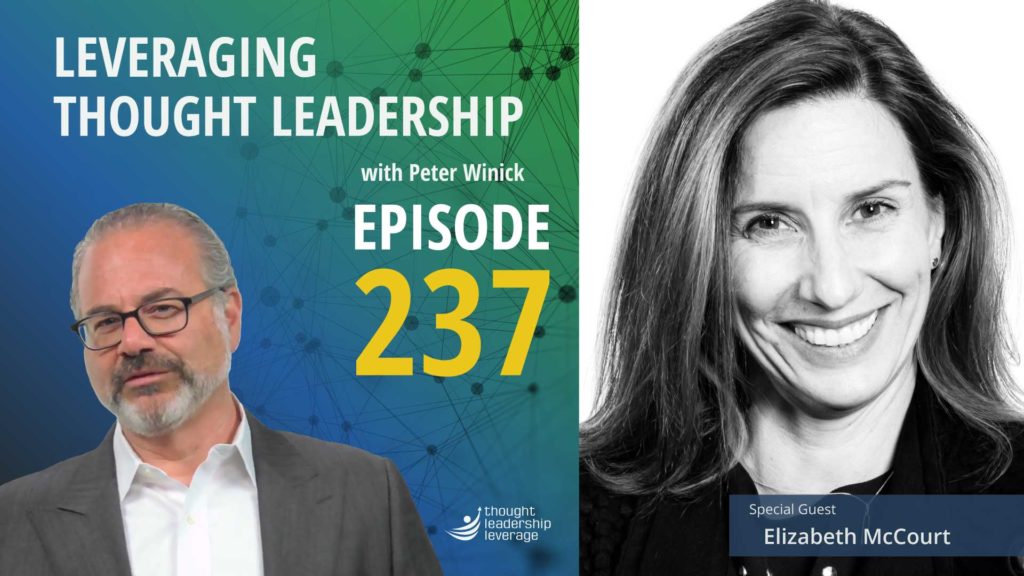


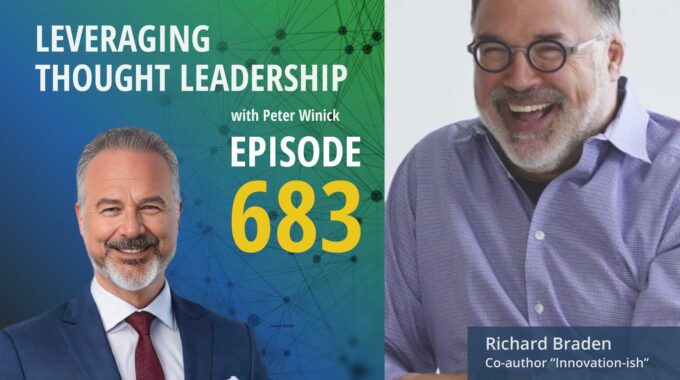
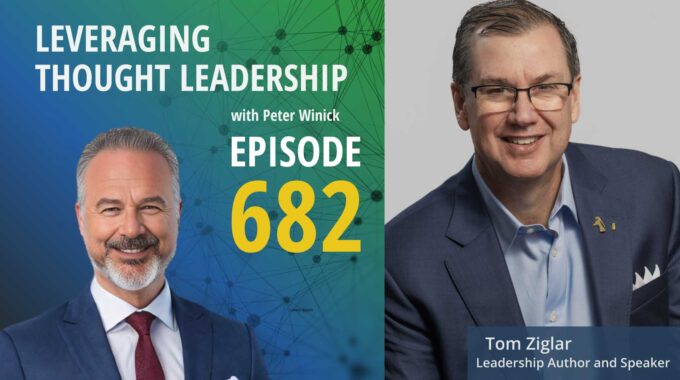
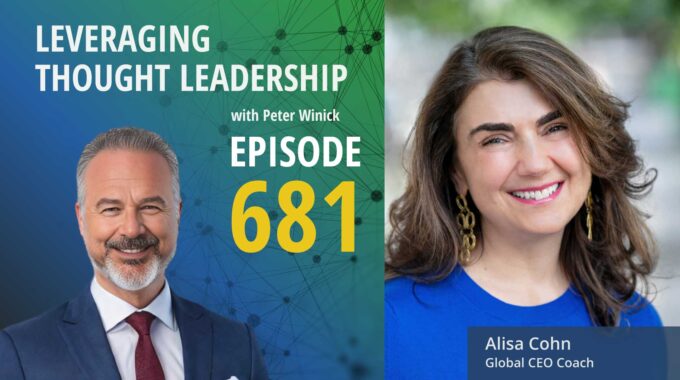
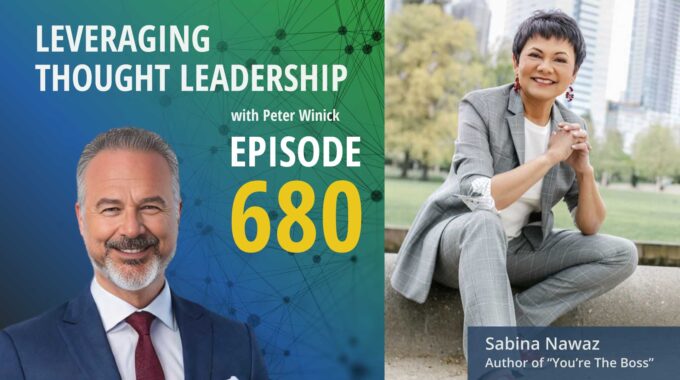
Great interview! I loved how Elizabeth said that everything in our lives leads us to where we should be. That’s certainly the case in my life. Interesting to see someone who’s made such a success of having a non linear portfolio career.